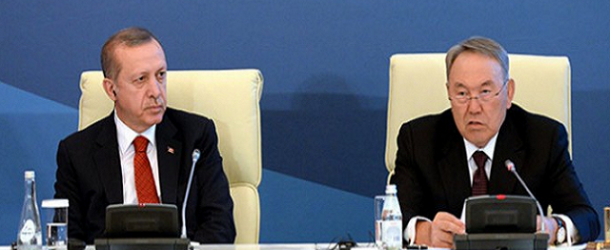President Recep Tayyip Erdogan’s three day visit to Kazakhstan that drew attention of experts has ended. Turkey is one of the closest and most reliable partners of Kazakhstan. A number of documents were signed within the state visit of Turkish leader. This included a joint statement followed by a meeting of the Council on strategic cooperation of high-level between Republic of Kazakhstan and the Republic of Turkey and the Protocol on the updating of the Action Plan within the framework of the Joint Economic Program “New Synergy”.
The list of discussed issues is wide enough which included further strengthening of Kazakh-Turkish strategic cooperation, development cooperation of wide range of relationships, ways to deepen ties in economic, trade, investment, industrial, transit transport, cultural and humanitarian sphere, the possibility of creating a customs Union of Turkic-speaking countries, share acquisition in Kazakhstan Turkish Trans-Anatolian gas pipeline. Nazarbayev and Erdogan also reviewed relevant aspects of international and regional agenda.
Parties reaffirmed the intention to increase bilateral trade from 3.5 billion to 10 billion USD in the coming years. Within Kazakh-Turkish business forum with the participation of presidents of two countries, representatives signed 19 business deals worth more than $800 million. In particular, agreements were signed in regards to the construction of plants for the production of aluminum radiators, window and door accessories, waterproofing and roofing materials, steel pipes, various forms of concrete, as well as to cooperate in the development of commercial and military shipbuilding, ship repair and maritime transport. It was stated additionally that Kazakhstan and Turkey are to implement joint economic projects in several other countries.
Kazakh President Nursultan Nazarbayev earlier (at the summit of the Cooperation Council of Turkic Speaking States) reported the willingness of Turkey to join the Eurasian Economic Community (EAEC), today announced that through Turkey, Kazakhstan can go to Europe and the Middle East, and the EAEC “open up opportunities for Turkish business to enter into new markets.” To remind, Nazarbayev proposed to include Turkey in Customs Union in the end of 2013 at a meeting of the Supreme Eurasian Economic Council in Minsk. In context of strengthening China and crisis in Ukraine, Kazakhstan feels certain uneasiness. Kazakhstan intends to counterbalance by involving Ankara in integration processes. Moreover, Turkey meets the criteria of a regional power and to some extent able to compete with China and Russia. In addition, Kazakhstan has no access to sea which eventually forces it to use services of coastal countries. The problem of access to the sea appeared in the Kazakh agenda on the eve of the Customs Union as one of the reasons to participate in the integration project. In short, Kazakhstan is attempting to use its unique position of “Middle State”, located between two major markets in Europe and Asia in the heart of Eurasia.
Ankara is naturally interested in strengthening Turkic integration, and such trend exists likewise in Kazakhstan’s foreign policy and in a pragmatic economic cooperation with Kazakhstan. Turkic vector for Turkey’s foreign policy is traditionally important by virtue of the original Turkic-Turkish ideology, which was laid at the base of the Turkish Republic Ataturk.
Erdogan’s visit to Kazakhstan can be also obviously considered in the context Turkey’s current foreign policy challenges as EU integration was not possible. In addition to standard requirements of the European Union, there are civilizational issues raised related to the belonging of Turkey to Islamic world, and doubts of legitimacy of its inclusion in the “European family” of nations are voiced. The Cyprus problem as a serious obstacle to Turkey’s integration into the EU is remained unsolved.
The question of Turkey’s accession is losing actuality in the course of the time, even though accession to EU is an important socio-political, economic, ideological and even self-identification issue in recent decades. In January 2015, President Recep Tayyip Erdogan said that his country is no longer interested in EU accession.
President Erdogan carries out a range of measures to strengthen the relations with Turkic states to compensate for this, and reinforces ties with Russia, as well as with a number of neighboring countries of Turkey. Hence, Ankara has paid an increased interest in the use of political and economic potential of the Eurasian integration putting some special meaning in it. In addition, the inclusion of Turkey in the EAEC would be logical, given the incipient rapprochement between Ankara and Moscow. According to some experts, Russia will be against Turkey’s accession to the Eurasian Economic Union. They hold different views on Syria, Crimea and economic relations. Moreover, in their opinion, such an alliance would have too many centers of power and negotiation on any issue would be more difficult. Turkey’s accession to the SCO looks more realistic which will benefit from Turkey’s membership.
The visit is considered as particularly important in the context of potential strengthening positions of Iran in international arena and evaluation of Ankara’s potential to influence on this situation. Ankara and Astana are interested in joint cooperation with Iran now.
Turkey promised to support Kazakhstan’s candidacy for non-permanent members of the UN Security Council. Turkish President Recep Tayyip Erdogan said: “Regarding the candidacy in various international platforms, we continue to support each other states. Kazakhstan puts forward its membership in the UN Security Council for 2017-2018. Turkey, of course, will support the people of Kazakhstan, and Kazakhstan, and in the course of this campaign, our relevant bodies will put all efforts to support this candidacy.” Turkish President also expressed hope to complete negotiations on Kazakhstan’s accession to the World Trade Organization in nearest future.
In general, Kazakhstan and Turkey maintain relationship of trust, and there are no contradictions in politics that can constrain and limit comprehensive cooperation.
Elsevar ABDULLAYEV
Kaynak: Newtimes.az

























































